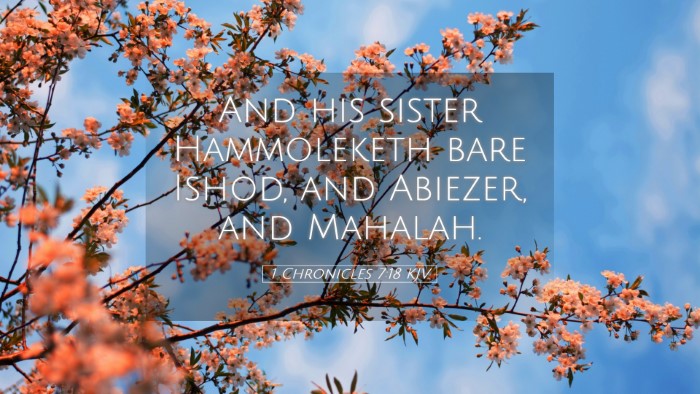Commentary on 1 Chronicles 7:18
Verse Text: "His daughter was Sheerah, who built both Lower and Upper Beth-horon, and Uzzen-sheerah." (1 Chronicles 7:18, ESV)
Introduction
This verse highlights significant contributions from Sheerah, illustrating the involvement of women in biblical history. The construction of cities by Sheerah serves as a focal point, shedding light on her influence and the broader context of the tribe of Ephraim.
Historical Context
Tribal Significance: The mention of Ephraim's lineage is critical. Ephraim was one of the prominent tribes of Israel, and understanding the families descending from him enriches our comprehension of Israel's socio-political structure. The history of Ephraim is contained within a larger narrative that depicts the turbulence and triumph of Israel.
Sheerah's Legacy: The inclusion of Sheerah underscores a shift in perception regarding women's roles in biblical narratives. While traditionally, genealogies and triumphs in warfare are attributed to men, Sheerah's expertise in construction demonstrates her agency. In ancient Near Eastern society, city-building was often a male-dominated endeavor, making her accomplishments noteworthy.
Commentary Insights
- Matthew Henry: Henry notes that Sheerah’s achievements signify divine justice and provision, as through her, the Lord demonstrated his favor upon Ephraim. The construction of cities indicates growth and prosperity and emphasizes the importance of leadership—both male and female—within Israel.
- Albert Barnes: Barnes expounds on the names of the cities built by Sheerah, indicating their strategic importance. Lower and Upper Beth-horon were key locations for military routes located near the hills of Ephraim. This geographical information illustrates strategic foresight and administrative ability on Sheerah’s part providing insight into her character.
- Adam Clarke: Clarke points out the neglect of Sheerah's character in other biblical texts and highlights her role as an exception among a predominantly male genealogy. He expands this into a broader reflection on how God uses individuals of all backgrounds for His purposes—attesting to the divine ability to empower anyone willing to serve.
Theological Reflections
The construction of cities by Sheerah can be seen as an embodiment of God's purposes flowing through surprising channels. From a theological perspective, it is essential to recognize that God often utilizes unconventional means to accomplish His will. This theme resonates throughout Scripture and remains relevant for contemporary ministry and scholarship.
The Role of Women: Sheerah’s story is valuable in theological discussions about gender roles in the church today. Her innovative spirit and capability provide a paradigm for recognizing and affirming the contributions of women in both historical and modern contexts, encouraging a more inclusive view of church leadership.
Community Building: The cities Sheerah established bear witness to the importance of community and safety in ancient Israel. Her legacy encourages spiritual leaders to consider not just physical structures but the importance of building up people and their relationships within community spaces.
Practical Applications
The study of 1 Chronicles 7:18 offers several applications for pastorial care, theological education, and community engagement.
- Encourage Leadership: Pastors are encouraged to foster environments where both men and women can flourish in their spiritual gifts, taking cues from Sheerah's leadership and contributions.
- Community Development: The church is called to emulate Sheerah’s efforts in community building, developing programs that nurture collective growth similar to the cities of Lower and Upper Beth-horon.
- Value Every Contribution: Each member’s contribution to the body of Christ should be acknowledged. Preaching and teaching should reflect an inclusive theology that champions the roles of all believers, regardless of gender.
- Prioritize Legacy: Church leaders should instill a sense of legacy within their congregations that inspires others to build upon what has been established, emphasizing the continuity of faith across generations.
Conclusion
In 1 Chronicles 7:18, the mention of Sheerah as a builder reflects a broader theological truth that God utilizes various individuals, including women, to fulfill His divine plans. Recognizing her story prompts a re-evaluation of historical narratives and encourages communities to promote inclusivity, growth, and legacy-building. As students and scholars engage with this text, may they draw insights that enrich their understanding of the multifaceted nature of God’s kingdom.


